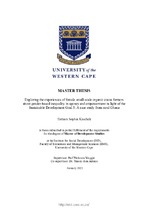| dc.contributor.advisor | Waggie, Firdouza | |
| dc.contributor.author | Kaschek, Tamara Sophia | |
| dc.date.accessioned | 2022-02-04T09:08:47Z | |
| dc.date.available | 2022-02-04T09:08:47Z | |
| dc.date.issued | 2021 | |
| dc.identifier.uri | http://hdl.handle.net/11394/8674 | |
| dc.description | Magister Artium (Development Studies) - MA(DVS) | en_US |
| dc.description.abstract | In all parts of the Global South, female farmers face challenges to access productive resources
and output markets in an equal manner as male farmers, which is referred to as
the gender gap in agriculture. In Ghana, where cocoa is one of the major cash crops, these
systematic disadvantages mean that female small-scale cocoa farmers face challenges to
equally benefit from cultivating the cash crop. Even though there is agreement among
researchers that quantitative differences in access to assets result from underlying social
gender norms and intra-household inequalities in bargaining power, there is a research
gap as to how these underlying causes affect female small-scale cocoa farmer’s agency
and empowerment in private and public spheres. | en_US |
| dc.language.iso | en | en_US |
| dc.subject | gender | en_US |
| dc.subject | inequalities | en_US |
| dc.subject | empowerment | en_US |
| dc.subject | gender gap | en_US |
| dc.subject | sustainable development goals | en_US |
| dc.title | Exploring the experiences of female small-scale organic cocoa farmers about gender-based inequality in agency and empowerment in light of the Sustainable Development Goal 5: A case study from rural Ghana | en_US |

